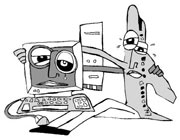AT LAST, SEATTLE’S love affair with the World Trade Organization has ended.
Last week, Phil Condit and Bill Gates, official co-hosts of the 1999 WTO ministerial meetings in Seattle, found out what all those annoying protesters were talking and screaming about.
Their companies, Boeing and Microsoft, respectively, are among the corporations most affected by a ruling, issued last Monday by a WTO dispute panel in Geneva, that a tax break the U.S. government gives to U.S.-based corporations for export sales violates free-trade rules.
The ruling will be the costliest yet for the United States in a WTO- litigated challenge. The break is worth many billions of dollars a year to U.S.-based corporations.
According to its annual reports, Boeing’s benefits from the law amounted to $130 million in 1998, $230 million in 1999, and $291 million in 2000. In case you’re counting, that’s $650 million in corporate welfare to one company in three years. Naturally, the ruling does not mean Boeing or other beneficiaries will have to pay the money back—just that they can’t collect further benefits in the future.
The WTO ruling also doesn’t automatically strike down the U.S. law, but it does authorize the European Union (which filed the original complaint) to seek up to a whopping $4 billion a year in trade sanctions unless Congress changes the law to comply with the ruling. Ironically, Congress already did so once, after a previous unfavorable WTO ruling on the same program. But Congress didn’t change it enough to satisfy the WTO, leaving the subsidy effectively in place.
Undoubtedly, politicians, CEOs, and even some ordinary citizens will take offense at all this. What business is it of some unaccountable corporate lawyers in Geneva, they’ll say, if the U.S. government passes a law it deems in the best interests of its people, and that law only applies within its borders?
This, as it happens, is precisely the point the critics of institutions like the WTO and International Monetary Fund have been making for years. The quick and easy answer is that the U.S. government’s tax breaks are no more the WTO’s business than the domestic environmental or worker-safety laws that the WTO has gutted.
The chance that any of Seattle’s civic or business leaders are going to admit that those anti-WTO hooligans were right is about as likely as my backing Mark Sidran in the 2005 mayoral race. Seattle was deeply wounded by the form of what happened during those protests—to the point that over two years later, the city and the Seattle Police Department are still terrified of more than five global justice protesters in one place. As a consequence, local mandarins also tend to dismiss the content of the protesters’ critique: that institutions like the WTO represent an intolerable infringement on local jurisdictions’ ability to make and enforce their own laws—good, bad, or indifferent—whether it’s for environmental protection or a massive tax break for Boeing.
But the hordes of protesters are long gone; they left town when the WTO did, and Seattle (and the Seattle Police Department) needs to get over it. Specifically, local leaders need to quit pretending that citing our state’s reliance on foreign trade serves as any kind of an excuse for the flaws in how that trade is currently structured.
If the WTO starts taking aim more consistently at corporate subsidies in the U.S., it may even be possible that the local officials who are so fond of such subsidies—for example, Pat Davis and her cronies at the Port of Seattle—might start having doubts about the monster they’ve cheered for. Heck, they might even notice the enormous chasm between their “free market” rhetoric and their heavily taxpayer-assisted reality. We can only dream.







